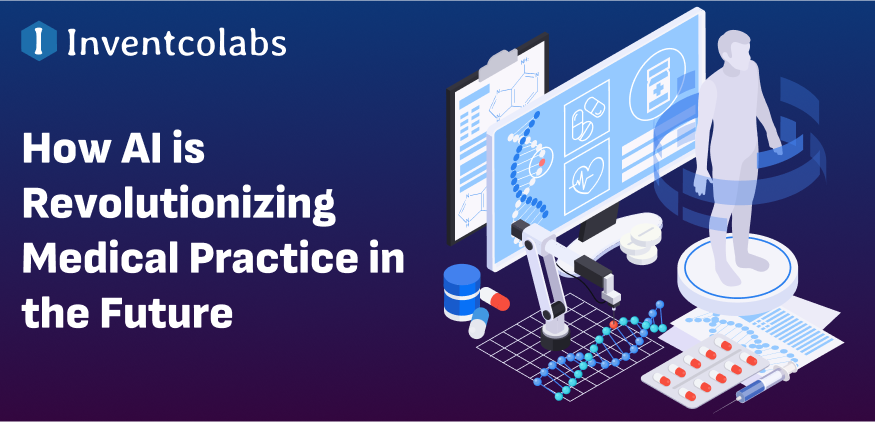In the ever-evolving healthcare landscape, Artificial Intelligence (AI) integration has emerged as a transformative force, particularly in home care management. The intersection of AI-based home healthcare software development has paved the way for innovative solutions that enhance patient care, streamline processes, and provide personalized assistance. This introduction sets the stage for exploring the development of an AI-based homecare management app. This endeavor promises to revolutionize healthcare delivery in the comfort of our homes. From intelligent monitoring to predictive analytics, this development journey aims to leverage the power of AI to create a sophisticated and responsive platform, ultimately fostering a new era of efficient, patient-centric home care management.
Types of homecare software
Nowadays, the usage of technologies like Artificial Intelligence is increasing in healthcare. It’s changing many things, like how researchers are directed, how administrative processes are streamlined, and how patient care is improved.
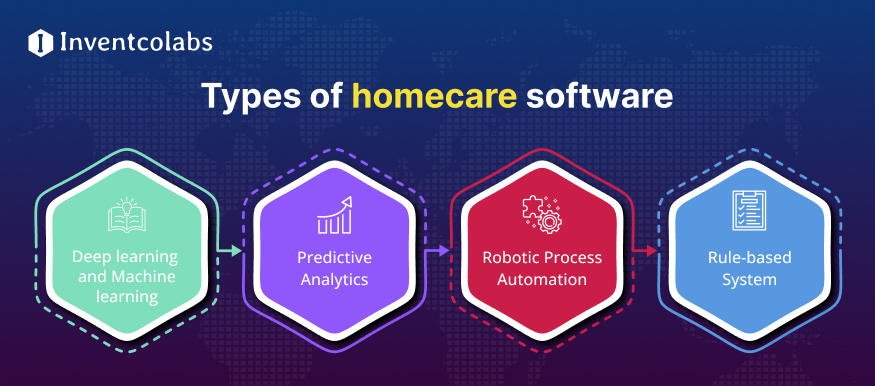
Let’s examine the many forms of AI technologies applied to creating medical applications.
-
Deep learning and Machine learning
The most emphasis is given to artificial intelligence technologies that deal with training models utilizing data. Neural networks and deep learning, two subfields of machine learning, are the two most complex elements of machine learning used for outcome prediction and healthcare research.
-
Predictive Analytics
This branch of artificial intelligence and machine learning analyzes data to find connections and patterns that can be used to forecast future events. Clinicians, doctors, and other specialists use this technology in the medical industry to assess patients’ symptoms and prescribe treatments accordingly. Additionally, it can determine when the clinics or hospitals are most crowded to warn upcoming check-ins. This allows for better staff placement and the optimization of appointment scheduling activities.
-
Robotic Process Automation
The technique of automating workflow using computer programs on servers that follow rules and scripts is known as robotic process automation or RPA. This approach endows the system with intelligence. Automation of routine administrative operations like updating patient information, billing, and authorization is made possible by robotic process automation (RPA) in healthcare apps. This boosts productivity and operational efficiency.
-
Rule-based System
These ‘if-then’ rules-based procedures are considered the industry standard for clinical decisions in the healthcare sector. Human expertise and a specified set of rules are required to create this system. However, because it is time-consuming and may result in rule conflicts, this approach is being phased out in favor of more sophisticated machine-learning techniques and algorithms.
Use of AI in homecare
It is projected that care services valued at $265 billion will be moved from conventional facilities to their residences by 2025. This action will consider the requirement for convenient and quick medical facilities. The next-generation healthcare app development company’s contribution to advancing technology in the healthcare sector is directly responsible for everything that has been achieved.
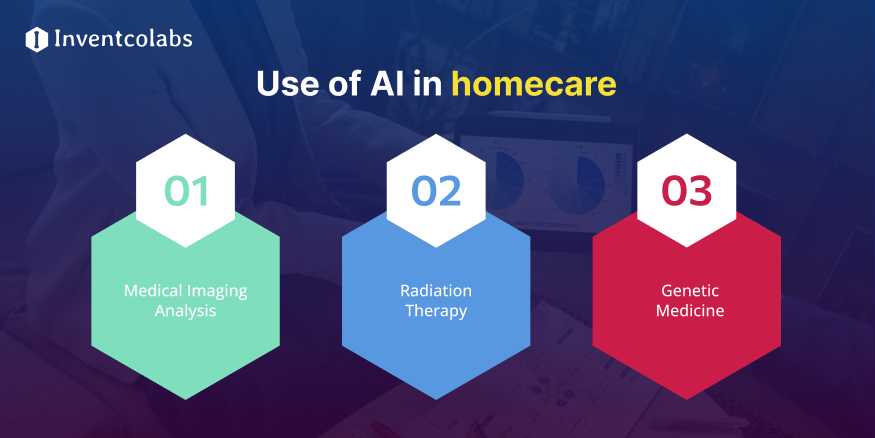
Artificial intelligence and healthcare support a range of medical tasks, ensuring that procedures are finished more rapidly, meeting workforce demands, reducing expenses and enhancing patient satisfaction. Artificial intelligence has many uses in the development of healthcare applications, such as the following:
-
Medical Imaging Analysis
Medical specialists like radiologists and cardiologists may assess MRIs, scans, and X-rays, scans quickly and accurately by using artificial intelligence apps for medical imaging analysis. This enhances their capacity to recognize anomalies, illnesses, and abnormalities, enabling them to make more accurate diagnoses and prevent reading errors.
-
Radiation Therapy
Many Healthcare apps gather patients’ electronic health information to optimize radiation therapy treatments for cancer patients. Medical personnel can make informed decisions regarding radiation doses since artificial intelligence can recognize out-of-date records. This improves radiation therapy’s effectiveness and safety while preserving healthy cells.
-
Genetic Medicine
An advanced application of AI technology in the healthcare sector involves the exploration and development of medications for genetic disorders. Healthcare experts can customize treatment plans to the individual needs of their patients by analyzing DNA databases and forecasting any changes that could lead to illness.
Explore more: How To Create A Medicine Delivery Mobile App?
How is AI revolutionizing homecare software development services?
Home healthcare provides a better experience for the patient population than hospital treatment. Hospitals are already using artificial intelligence in their daily operations. This case only highlights the importance of data science—in particular, Artificial Intelligence and Big Data for the home care sector. The gathering, processing, and organization of data using artificial intelligence will significantly aid in making it easier for people to use the vast amount of data to provide personalized help to people. Here are two of cases that you can consider:
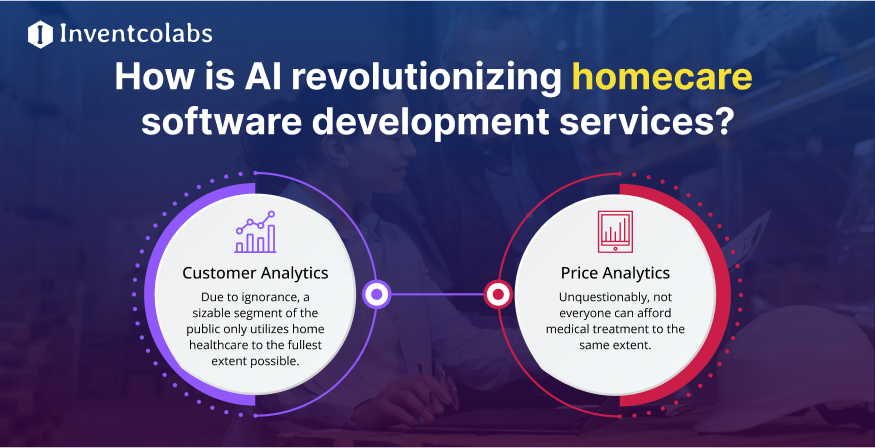
-
Customer Analytics
Due to ignorance, a sizable segment of the public only utilizes home healthcare to the fullest extent possible. They are ignorant that using home health care can help them handle the issues they need to cater to. Instead, people head to the hospital for many reasons. With the use of Artificial Intelligence and Big Data, it is feasible to identify and classify the client base precisely. Also, Marketing Mix Modeling determines which promotional and marketing methods are most effective for each group in terms of effect, reach, and return on investment by utilizing the sales and marketing data that is currently accessible. This will help spread awareness of the advantages of receiving home health care to more people.
-
Price Analytics
Unquestionably, not everyone can afford medical treatment to the same extent. People can afford many levels of medical treatment depending on their financial situation. The same guidelines also apply to home health care. It is not practical to price the services uniformly for all customers; they should be priced reasonably. The application of data science makes it possible to create income-based customer segments. Different healthcare services can be priced stratified so everyone can access and afford them.
Explore more: How To Build A Medical Billing Software: Cost, Types & Key Features
Benefits of AI-based homecare management
Think about how homecare software could be enhanced to new heights with the help of artificial intelligence. Artificial intelligence’s deep data analysis, pattern recognition, and intelligent decision-making powers have the potential to transform the home care sector completely:
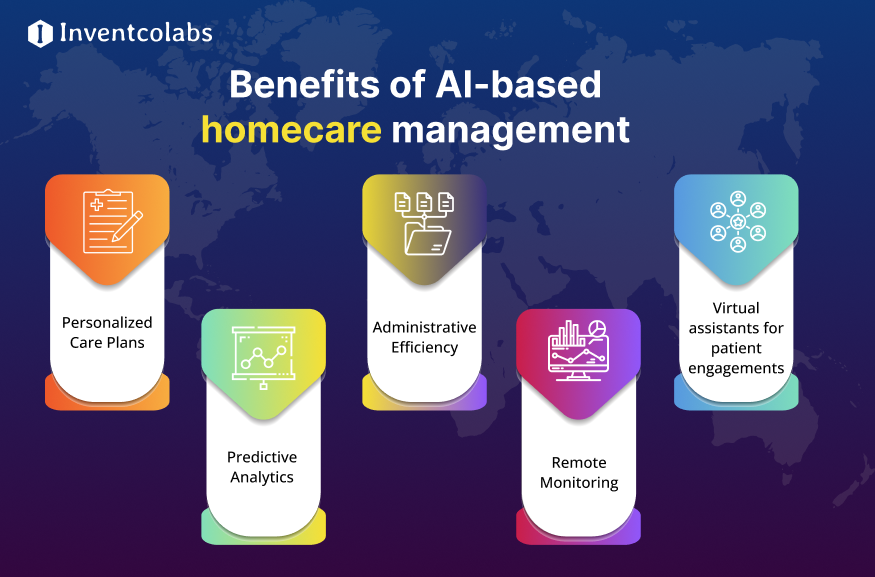
-
Personalized Care Plans:
Artificial intelligence-powered software can create individualized care plans for every patient. Artificial intelligence systems can tailor care plans to each patient’s unique needs, preferences, and even lifestyle by examining patient data and past health trends. This personalization raises the standard of care and improves the whole patient experience.
-
Predictive Analytics:
The predictive ability of artificial intelligence in home health software is astounding. Predicting possible health risks by analyzing data trends, patient behavior, and other relevant features is possible. Artificial intelligence, for example, can identify people who are more likely to fall, stop taking their medications, or whose health conditions are worsening. This makes it possible for medical staff to act proactively and avoid unexpected outcomes.
-
Administrative Efficiency:
In-home care providers often have administrative duties that require a lot of time and resources. Artificial intelligence-powered homecare software can relieve this strain by automating many administrative tasks. Processes can be streamlined with artificial intelligence. It includes scheduling patient visits, taking care of invoicing, and allocating resources within the company as efficiently as possible. Home care assistance app takes care of all these particulars to work better for patients.
-
Remote Monitoring:
Home care is being revolutionized by remote monitoring powered by artificial intelligence. Wearable technology and sensors make it feasible to monitor patients in real-time, and artificial intelligence algorithms can instantly analyze data and vital signs as they happen. This minimizes the number of times patients must be readmitted to the hospital by enabling the early detection of any deviations from the norm, allowing for rapid interventions.
-
Virtual assistants for patient engagements:
Artificial intelligence-driven virtual assistants are increasing patient participation’s effectiveness and accessibility. These aides can provide patients with important information, remind them to take their prescriptions, and even answer basic inquiries about their health. Virtual assistants help to improve patient satisfaction and compliance by fostering better interaction and communication.
As a business, why must you consider AI-based homecare software development?
In the dynamic landscape of healthcare, businesses are increasingly recognizing the indispensable role of technology in optimizing and revolutionizing homecare services. The advent of AI-based homecare software development is a pivotal opportunity for companies to enhance their service offerings and stay at the forefront of innovation. Integrating artificial intelligence brings many benefits, including improved patient outcomes, streamlined operational processes, and personalized care delivery.
One compelling reason businesses consider AI-based homecare software systems as it has the potential to provide enhanced patient care and satisfaction. These advanced home care mobile apps can intelligently analyze patient data, monitor vital signs, and predict health trends, allowing for proactive interventions and personalized care plans. This leads to improved health outcomes and establishes a more meaningful and trusting relationship between healthcare providers and patients.
Development steps for AI-based Homecare app development
Here is the procedure of developing the right solution that is efficient and innovative for the users. Have a look at the steps listed below:
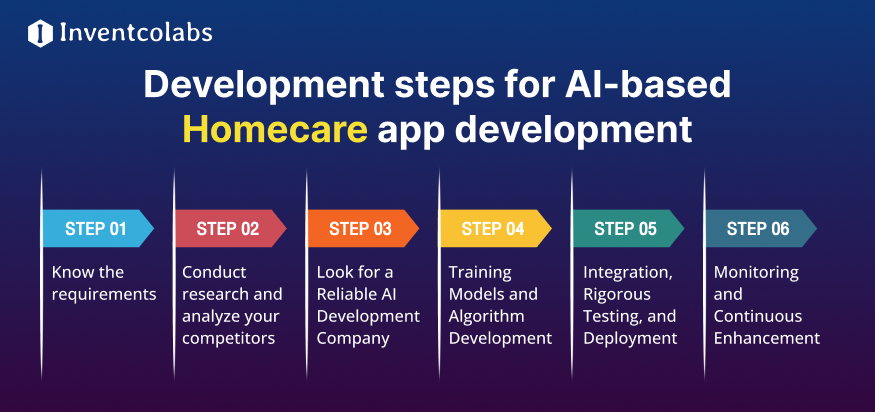
-
Know the requirements:
Being a healthcare provider you should know the key challenges involved in the industry and how a reputed software development company can help you in providing a solution. It is very much important that you should have a healthcare software developer. You can only successfully invest in healthcare app development initiatives once you have determined your purpose.
-
Conduct research and analyze your competitors:
Once it is identified that artificial intelligence software is required in the company, then being the owner, you need to know in-depth about it. If required, you can choose a homecare app development company to help you with research work. Also, you can analyze the competitors strategies and know about all the services and products they offer.
-
Look for a Reliable AI Development Company:
One of the most critical steps in producing your artificial intelligence software is to locate the most qualified healthcare app development company to provide you with professional developers for your project. Suppose you decide to go with an in-house team. In that case, you will be forced to undergo the laborious process of interviewing, hiring, and training a full-time developer to fulfill your requirements instead of outsourcing the work. There will be an increase in the budget, and the timeframe for completing the creation of your artificial intelligence healthcare software will be extended. For this reason, it is best to hire dedicated developers from a reputable AI software development business.
-
Training Models and Algorithm Development:
Your team responsible for developing mobile healthcare applications will choose the algorithms based on the type of data available and the proposed project’s difficulty level. Standard techniques such as convolutional neural networks (CNNs), recurrent neural networks (RNNs), and support vector machines (SVMs) will be utilized by the healthcare solution provider that you work with. Following the selection of the algorithm, the subsequent step may involve the construction of machine learning or deep learning models. The model’s architecture needs to be designed, the mobile app development company needs to choose appropriate layers and connections, and they need to establish the input and output structure.
-
Integration, Rigorous Testing, and Deployment:
Your business will finish the integration, allowing for the seamless data interchange between AI-driven software and your existing healthcare system. After the application has been incorporated, it is time to perform exhaustive testing on the artificial intelligence software solution to guarantee that it functions without hiccups. Professionals specializing in developing artificial intelligence applications offer human and automated testing methods to demonstrate the software’s precision. The final step is for your AI application development services to deploy the healthcare AI solution they have developed when testing has been completed, and they have decided that the solution is accomplishing its intended goal.
-
Monitoring and Continuous Enhancement:
It is essential to monitor the development of artificial intelligence software for healthcare. You should select a home care app development studio that offers post-custom support services and consistently monitors your digital product’s operation. It is via collecting feedback and implementing any necessary modifications to the AI-based healthcare application that its continued success will be secured.
Conclusion
In conclusion, the journey through the realms of AI-based homecare management app development unveils a transformative narrative in the healthcare landscape. Integrating Artificial Intelligence into homecare services presents many opportunities for businesses to redefine patient care and operational efficiency. The intelligent monitoring, predictive analytics, and personalized care delivery facilitated by these applications underscore their potential to revolutionize how we approach healthcare in a home setting.
Frequently Asked Questions
Q. How does AI enhance the efficiency of home care services?
ANS. AI streamlines homecare services by automating routine tasks, optimizing schedules, and providing real-time insights. It allows caregivers to focus on personalized care, improving overall service efficiency.
Q. How does AI contribute to the overall improvement of homecare services?
ANS. AI contributes to improving homecare services by enhancing efficiency, personalizing care plans, improving medical monitoring, and fostering proactive interventions.
Q. What features are typically included in Homecare Management App Development?
ANS. Homecare Management Apps often include features such as automated scheduling, medication reminders, health monitoring, predictive analytics, and secure communication channels to optimize caregiving tasks.
Q.Can homecare management apps integrate with existing healthcare systems?
ANS. Yes, many Homecare Management Apps are built to seamlessly integrate with existing healthcare systems, ensuring a cohesive flow of information.




